Key takeaways
- Existential ethics emphasizes personal responsibility in creating one’s own moral values in a world without inherent meaning.
- Authenticity requires consistent self-reflection and claiming personal choices, even amidst societal pressures and uncertainties.
- Ethical growth is a complex process marked by grappling with doubts, emotions, and the understanding that moral clarity evolves through experiences.
- Practical steps for ethical living include mindful awareness, small acts of kindness, and ongoing dialogue between internal values and external situations.
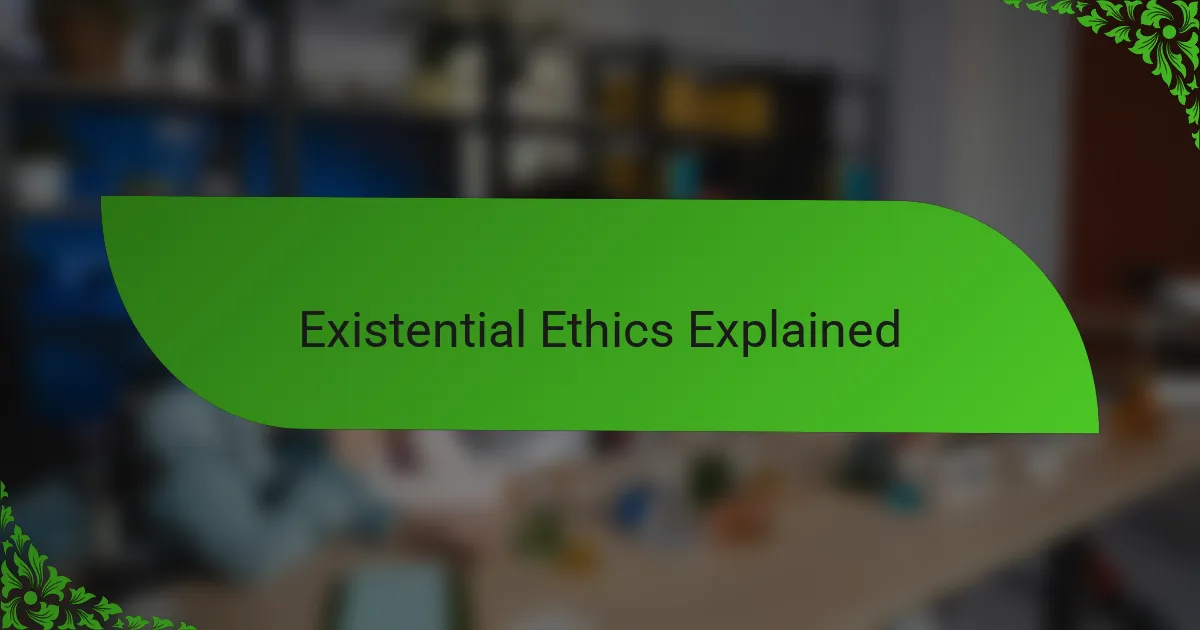
Existential Ethics Explained
Existential ethics, to me, revolves around the idea that we are each fundamentally responsible for creating our own moral values in a world without inherent meaning. Have you ever felt the weight of deciding what’s truly right when no rulebook seemed to apply? That personal responsibility can be both terrifying and liberating.
In my experience, existential ethics isn’t about following society’s pre-set norms but about daring to face uncertainty and act authentically. I recall moments when I questioned popular moral codes and realized that true ethical living required owning my choices, even when they felt lonely or difficult.
What strikes me most is how existential ethics demands honesty with oneself—a kind of moral courage we rarely talk about. It invites us to ask, “Who am I becoming through my decisions?” This ongoing self-reflection, I believe, is where the essence of existential ethics lies.
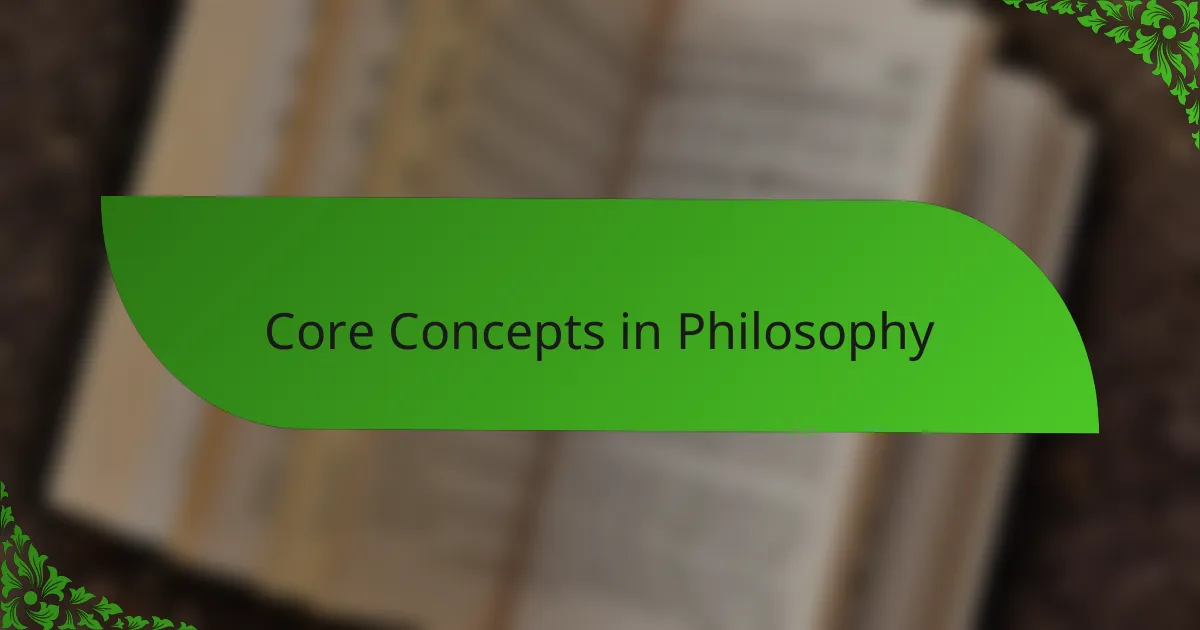
Core Concepts in Philosophy
Philosophy often feels like a vast landscape filled with diverse ideas, but for me, its core concepts form the sturdy foundation beneath it all. Concepts like existence, knowledge, and ethics aren’t just abstract terms; they’re the lenses through which I interpret life’s uncertainties. I’ve found that grappling with these ideas personally helps me make sense of my own experiences and decisions.
Have you ever paused to wonder what knowledge really means? I’ve wrestled with this question countless times, realizing that understanding isn’t just about accumulating facts but about deeply questioning what I believe to be true. This ongoing inquiry shapes how I engage with the world and others.
Then there’s the concept of existence itself—what does it mean to simply be? Philosophers have debated this for centuries, yet for me, it boils down to embracing the freedom and anxiety of being alive. It’s in this tension that I recognize the profound responsibility we have in shaping our own lives and values.
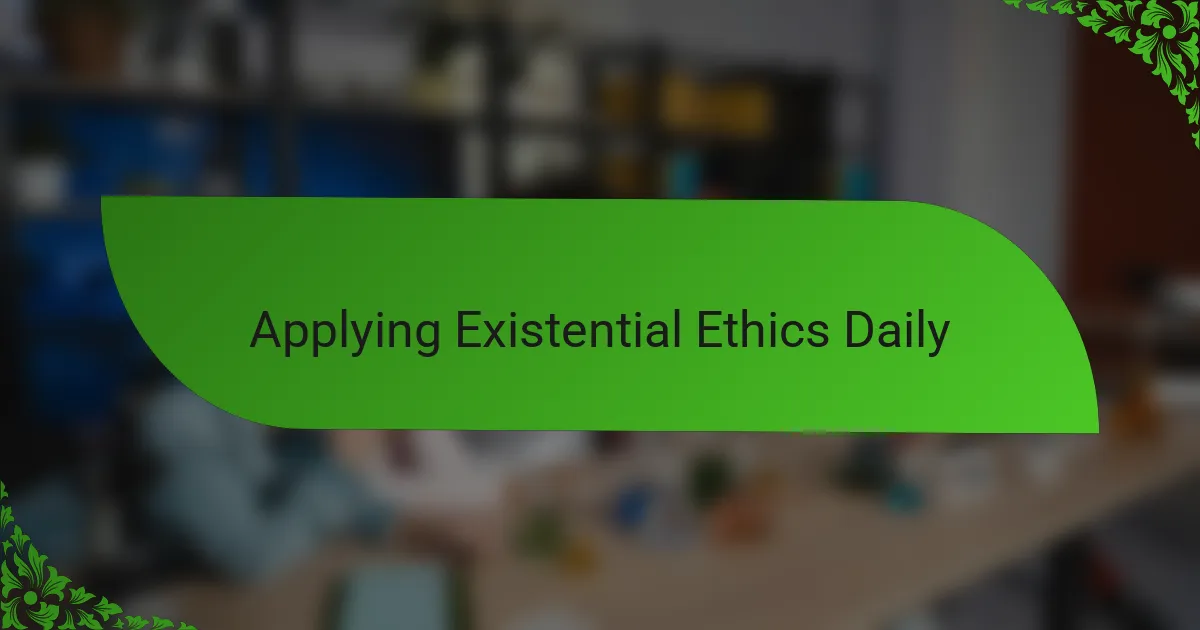
Applying Existential Ethics Daily
Applying existential ethics daily often feels like standing at a crossroads every morning, wondering which path truly reflects my authentic self. Have you noticed how small choices—what to say, how to act—become silent declarations of who you want to be? It’s in these moments that I realize ethical living isn’t about grand gestures but consistent, honest decisions.
I’ve found that daily practice demands a kind of attentiveness to my inner dialogue. When faced with frustration or temptation, I pause and ask: “Am I acting in a way that aligns with my own values, or am I just falling into someone else’s script?” This question, though simple, has saved me from many moments of regret.
At times, applying existential ethics feels isolating, as if I’m swimming against the current of societal expectations. Still, there’s something deeply empowering in owning that solitude, knowing that each deliberate choice strengthens my moral autonomy. Isn’t that what authentic ethical living is truly about?
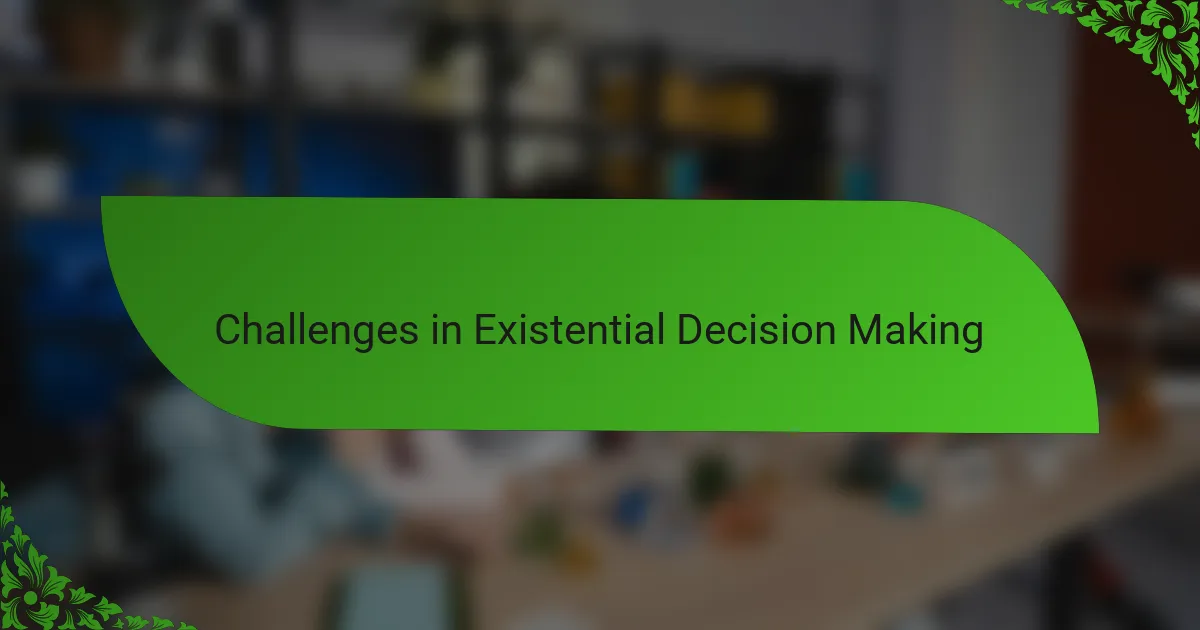
Challenges in Existential Decision Making
Sometimes, the hardest part of existential decision making is the sheer weight of freedom. I remember facing a choice where no option felt inherently right or wrong. Have you ever stood there, paralyzed, realizing that every decision must come from your own values, without any external guide? That moment of realizing you’re utterly alone in creating meaning can be quite daunting.
Another challenge I’ve noticed is the constant tension between authenticity and social pressure. Even when I know what feels true to me, I occasionally catch myself doubting, wondering if my choice might isolate me or disappoint others. How do you stay true to yourself without succumbing to the fear of judgment? It’s a question I wrestle with regularly.
Lastly, existential decision making often demands embracing uncertainty. Unlike following fixed rules, there’s no guarantee your choice leads to “the right” outcome—because, frankly, there might be no right answer at all. This ambiguity can leave you feeling vulnerable, but I’ve learned it’s also where genuine growth happens. Does that discomfort ever feel like a test of your resolve? To me, it certainly does.
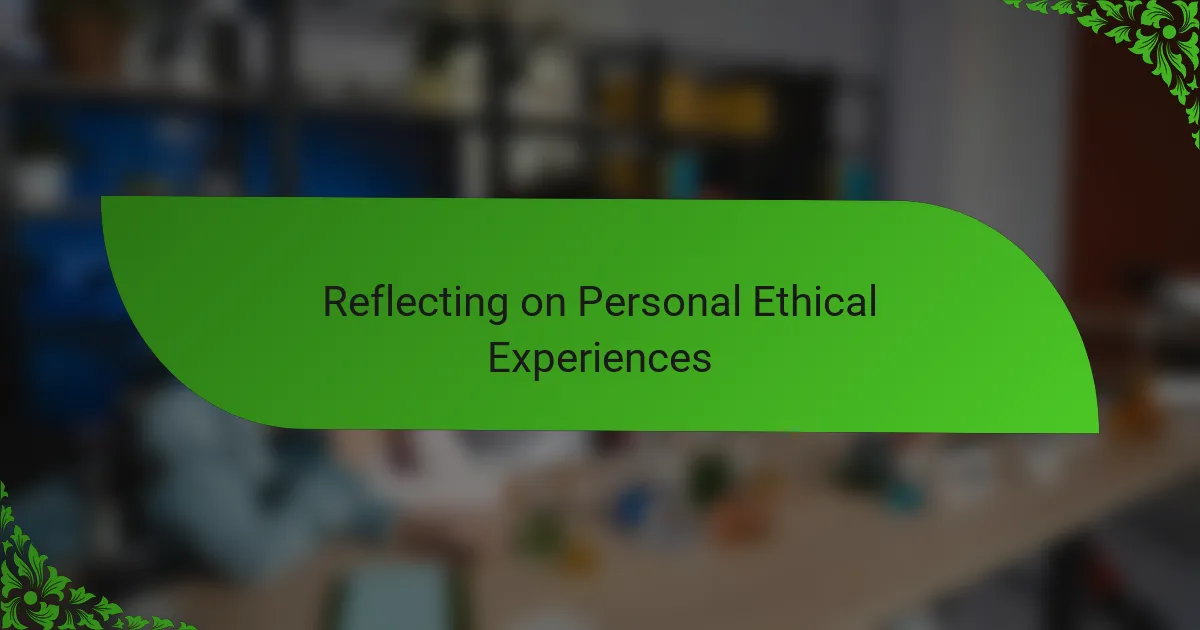
Reflecting on Personal Ethical Experiences
I often find myself replaying moments where my ethical choices weren’t clear-cut, like when a decision deeply affected someone close to me. Have you ever felt that mix of doubt and responsibility, realizing that your values alone had to guide you through a morally gray area? Those experiences, though uncomfortable, have been powerful teachers in understanding what truly matters to me.
Reflecting on these moments, I notice how my emotions—guilt, pride, confusion—play a crucial role in my ethical development. It’s not just about abstract reasoning; it’s about feeling the weight of my decisions in my daily life. Sometimes, I ask myself whether those feelings indicate I stayed authentic or if I compromised too much for comfort’s sake.
What really strikes me is how looking back on these personal ethical challenges reveals patterns I hadn’t seen in the moment. I realize that ethical growth isn’t a linear path but a winding conversation with myself, full of missteps and revelations. Have you caught yourself reconsidering past choices and discovering new insights about who you are becoming? For me, that reflection is both humbling and hopeful.
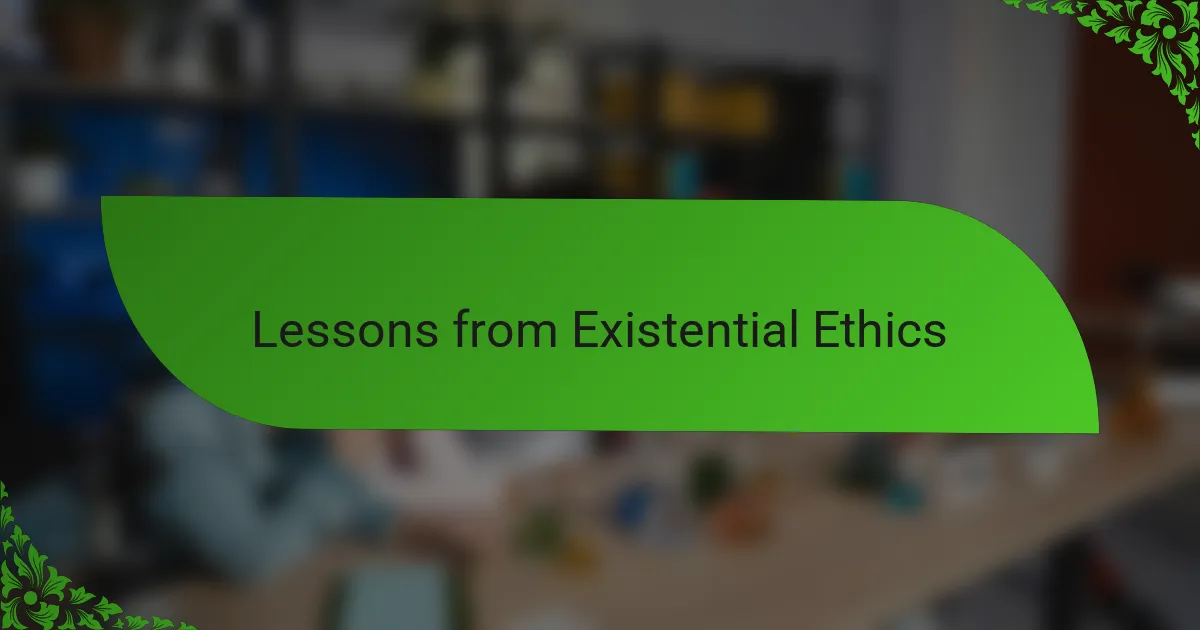
Lessons from Existential Ethics
What I’ve learned from existential ethics is that moral clarity rarely arrives fully formed—it’s something we craft through our struggles and reflections. Have you ever noticed how moments of doubt or discomfort can actually be the clearest indicators that you’re wrestling with what matters most? For me, these moments have been invaluable lessons in developing a deeper, more personal sense of right and wrong.
Another insight is how existential ethics teaches us to embrace responsibility without relying on external absolutes. This means owning the consequences of my choices, even when they lead to unexpected outcomes or conflict. Doesn’t that kind of accountability feel both daunting and strangely empowering at the same time? I’ve found that it pushes me to live more honestly and intentionally.
Finally, existential ethics reminds me that authenticity isn’t a destination but an ongoing journey. I constantly ask myself, “Am I being true to who I am becoming?” That question keeps me grounded amid life’s uncertainties and encourages me to keep choosing courage over comfort. Have you found that ethical living often feels more like a practice than a fixed position? I certainly have.
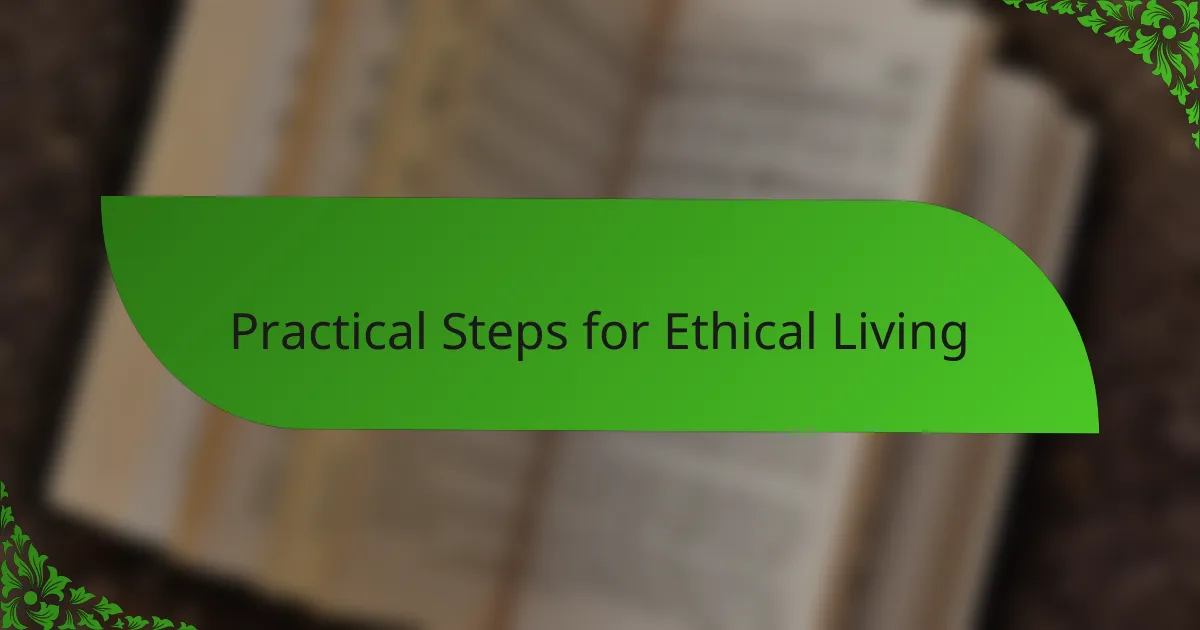
Practical Steps for Ethical Living
One practical step I’ve embraced is cultivating mindful awareness in everyday actions. Have you ever caught yourself acting on autopilot and later wondered if your behavior matched your values? By slowing down and intentionally reflecting before responding, I find that my choices become clearer and more aligned with who I truly want to be.
Another approach that resonates with me is embracing small acts of kindness as ethical practice. It’s easy to overlook how a simple gesture—a sincere compliment or standing up for someone—can ripple outward. When I intentionally choose compassion, I feel connected to something larger than myself, which grounds my ethical living in real human experience.
Finally, I’ve come to see ethical living as an ongoing dialogue between my internal values and the external world. How often do you check in with yourself to reassess your principles when faced with new challenges? Maintaining this reflective habit helps me remain authentic and adaptable, even when life throws unexpected dilemmas my way.